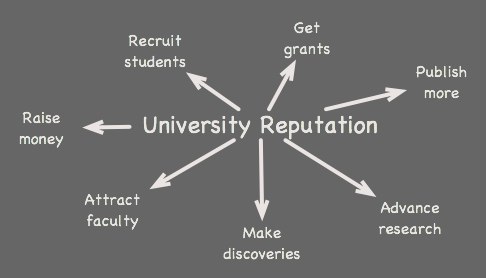The Meaning of Life for Higher Ed Marketers
I had a fascinating conversation with my boss, an experienced marketer from an agency background. The argument (because any conversation with either of us is typically an argument) sprang from my question:
What’s the goal of our homepage?
Looking at a handful of other higher-ed sites, we debated whether the point of our homepage was to recruit prospective students, help raise money from donors, or some combination of the oh-so-many goals from the oh-so-many audiences we all deal with.
His immediate answer: to tell the story of the University.
I haphazardly pressed on, of course. Telling stories isn’t a goal – it’s a strategy for achieving another goal. We have many goals, we just need to prioritize them. (I take this approach with clients who often think about web as something they have to do, not necessarily why they’re doing it.)
He elaborated that the real goal for the website – for our entire department and division, at the highest level – is to raise the reputation of our University.
We both had to leave, but I let this sink in.
Importance of Reputation
Reputation is the currency by which Universities are valued, compared, and selected. The strength of your reputation is what lets you compete for top students, top faculty, donor funds, and so on. Virtually all rankings are heavily influenced by reputation in one form or another. For instance, U.S. News & World Report’s World’s Best Colleges and Universities report has significant weight in “academic peer review.”

Reputation as a Goal
If the goal is “improve your reputation” then what’s your strategy? This should come from your executive leadership through the strategic planning process. Many schools have done this and these should guide the rest of your tactical efforts.
Measuring Reputation
Reputation is a case where “a rising tide lifts all boats.” There are 3rd-party rankings like the US News list. There are also feedback options from your student and faculty recruiting efforts. We obtain a report each year that summarizes the admissions process, including other schools applied for and the factors that played into the student’s decision.
Most importantly, I think it’s important for a school to ask that question of itself: how do we measure our own reputation? Most likely, it’s a measurement against its strategic goals. If the strategic goals are being met (or progress shown), then reputation should follow along.
Unfortunately, reputation is something that can be slow to climb and quick to fall. The key is to ask the question of each tactical decision: will this improve our reputation?
2 Comments
oak — January 30, 2009
Improving a university’s (or any entity’s for that matter) reputation is a matter of what Lou Holtz calls “WIN” or "What’s Important Now. Other have likened this to first picking the low-hanging fruit before worrying about the stuff you need a ladder to reach.
In that spirit, I would cheerfully recommend that you go to the “Fonts” folder in your computer, find the folder that is labeled “Comic Sans MS” and drag it to the trash bin.
Boom! Immediate reputation upgrade.
online casino — January 25, 2013
I had put together a short education and learning around the behind
that produces creating groups together with events.